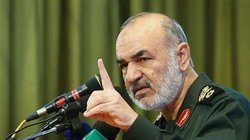 The chief commander of the Islamic Revolution Guards Corps (IRGC) says array of countries other than the Persian Gulf’s own littoral states can provide the region’s security.
The chief commander of the Islamic Revolution Guards Corps (IRGC) says array of countries other than the Persian Gulf’s own littoral states can provide the region’s security. RNA - "No [extra-regional] country or coalition of countries would be able to maintain security in this region save for the littoral states of the Persian Gulf," Major General Hossein Salami, who was speaking from the holy city of Mashhad, said on Thursday.
The IRGC's top commander added, “We believe in a regional security system with the participation of the Persian Gulf [littoral] states, and consider foreign presence in the Persian Gulf to be contradictory to security [of this region].”
He described any other security mechanism other than one, in which Iran and the rest of the regional states play the pivotal role, as “unfeasible,” reminding that all past experiences of foreign presence under the guise of security missions have only resulted in the “escalation of tensions and even warfare.”
The United States has announced plans to form a coalition to supposedly protect shipping in the Strait of Hormuz following a series of mysterious attacks on oil tankers in the strait and the Sea of Oman.
Washington has accused Iran of having a hand in those attacks, a claim Tehran has strongly rejected. Tehran has warned that such acts of sabotage may be part of a general ploy to target Iran amid increasing regional tensions.
The US has asked its allies to join the coalition, a call which has not been warmly received by several countries, including Germany, Japan and Spain, over apparent fears that such a mission could further ratchet up tensions with Iran.
‘Sanctions conducive to Iran’s progress’
Elsewhere in his remarks, the senior IRGC commander refuted the concept held by Iran's enemies that sanctions imposed on the country had acted to destroy and weaken its economy, calling the bans “instruments of our development and advancement.”
The US’ unilateral restrictive measures have provided the Islamic Republic with room to better avail itself of its national and indigenous capacities, he concluded.
"Iran is progressing and its signs are clear to everybody. Sanctions have not only failed to prevent our progress, but on the contrary, have created conditions, in view of our internal potentialities, without which we would not be able to activate our national and local capacities," the Iranian commander said.
The US returned its bans against Iran last year after leaving a nuclear agreement reached between Tehran and major world powers in 2015.
Iranian officials have recurrently scoffed at Washington’s misguided belief that the measures would bring Tehran to the negotiation table by taking a fast toll on the country’s economy.
847/940